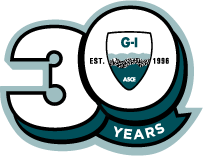Monday, March 9, 2026
Full Day Course | 8:00 am – 5:00 pm
CPT and Pile Foundations: Past Insights, Present Trends, and Future Prospects
Instructors: Abolfazl Eslami
In-situations penetration testing offers a more realistic understanding of soil characteristics and their variations on the investigated site than other common methods. This course provides valuable insights into applying CPT and CPTu to predict the axial bearing capacity of deep foundations via various direct and indirect methods. It explores scale effects in the correlation between piles and penetrometers, considering both toe and shaft capacity, including embedment depth, influence zone, diameter, penetration rate, and mechanism.
Morning Courses | 8:00 am – 12:00 pm
NGL, GMDB, and VsPDB Database Exploration Workshop
Instructors: Kristin Ulmer, Senior Research Engineer, Southwest Research Institute, Scott Brandenberg, Professor, UCLA, Tristan Buckreis, Post-doctoral Researcher, UCLA, Kenneth Hudson, Principal Geoscientist, Hudson Geotechnics
In recent years, several databases have been developed to advance geotechnical earthquake engineering by providing access to key data for a broad community including researchers, government agencies, and industry professionals. These include open-access relational databases such as the Next Generation Liquefaction (NGL) database, the Ground Motion database (GMDB), and the Shear-wave Velocity (Vs) Profile Database (VsPDB). In this pre-conference workshop, attendees will learn about the development of these databases, methods to access relevant data, and potential future benefits of using these resources.
Artificial Intelligence for Geoprofessionals
Instructors: Nick Machairas
This short course involves a review of the rapidly growing interest in AI/ML within geotechnical engineering research and practice, the rise of generative AI, data-centric AI, and opportunities in the profession to turn data into value. The short course also includes specific examples, while exploring the challenges related to big data and structured data within the geotechnical engineering profession and opportunities with open-source technologies.
Survey of the new Foundations and Earth Structures Design Manual (DM 7.2)
Instructors: Daniel VandenBerge, PhD., PE, Tennessee Tech, and Michael McGuire, PhD., PE, Lafayette College
A completely-new version of DM 7.2 was published in 2025 and is available to the public at the Whole Building Design Guide (wbdg.org) as UFC 3-220-20. This design manual replaces previous versions dating back to the 1980s that found widespread public use in professional practice and education. The new version spans 721 pages and is divided into seven chapters, a prologue, and three appendices. The chapters cover topics contained in the previous manual, updated to reflect the current state of practice, as well as additional topics, such as probability and reliability. This half-day short course will guide participants through the contents of the new manual and focus on ten new or heavily-revised topics in the manual that are worth a closer look.
The ten topics may include:
- Selecting appropriate shear strength methods for foundations and retaining structures
- Estimating excavation deformations
- Determining typical properties of engineered fills
- Use of log-spiral charts and equations
- Bearing capacity of shallow foundations in slopes
- Geotechnical analysis for mat foundations
- Neutral plane analysis
- Pile settlement
- Lateral capacity analysis of piles
- Estimation of COV for geotechnical parameters
For each of the ten focus topics, participants will learn about the relevant background and become familiar with the analytical methods through practical example problems. This short course is targeted to the geotechnical design practitioner; however, graduate students in geotechnical engineering will also find this course valuable.
Afternoon Courses | 1:00 pm – 5:00 pm
Simple Methods to Rapidly Characterize and Model Unsaturated Soil Behavior
Instructors: Xiong Zhang, Laureano Hoyos, and Marcelo Sanchez
Although significant progress has been made in the past six decades, unsaturated soil mechanics is not extensively used in routine engineering projects for several reasons: (1) the equipment needed to characterize unsaturated soils is expensive (80–150k), (2) the suction-controlled tests are time-consuming (1–3 months/soil, 3–5 years/soil), and (3) the theories for unsaturated soils are complicated to understand and model. This workshop will introduce simple methods to rapidly characterize and model unsaturated soils as follows: (1) A Modified State Surface Approach (MSSA) is used to explain unsaturated soil behavior, which can be easily understood by engineers without previous background in constitutive modeling. (2) Conventional testing equipment (single-cell triaxial, oedometer, and unconfined compression test apparatus) for saturated soils is used to rapidly characterize unsaturated soils (4–8 hours/test, 1–2 weeks/soil). (3) Step-by-step procedures are given to analyze these results for constitutive modeling purposes without sacrificing the theoretical accuracy. (4) Examples will also be given to demonstrate how to use the results for numerical simulation of unsaturated soil-related boundary-value problems. The well-known Barcelona Basic Model (BBM) will be used to demonstrate the proposed methods.
Sustainability and Life Cycle Assessment of Geo-systems
Instructors: Mina Lee
The short course will address the growing importance of sustainable practices in geotechnical engineering by offering an overview of sustainability concepts and the application of life cycle assessment in geotechnical engineering. Topics covered include principles of sustainability, the scope of sustainable geotechnics, state-of-the-art methodologies for sustainability assessment in geotechnical engineering, and case study applications to highlight benefits and challenges.
The Basics of Risk Mitigation
Instructors: Dan Becker, Dan Harpstead
This course will focus on four key strategies for managing and mitigating risks for Engineers on their projects. Those include 1. managing project financials, 2. understanding how contract provisions can affect project outcomes, 3. Key impacts to consider in your scopes of services and 4. how data protection requirements must be adhered to avoid costly penalties. The course will provide real world examples of how failing to implement these strategies can adversely impact your project and if implemented correctly can provide for successful projects for your organization and the client. Dan Harpstead P.E. , Risk Manager from Kleinfelder and Dan Becker P.E. independent consultant, both members of ASCE’s Committee on Claims Reduction Management (CCRM), will lead this Course. Our course leaders have over 90 years of experience in the design and construction industry and will draw on the collective experience in risk mitigation and claims reduction of all the CCRM committee members.
